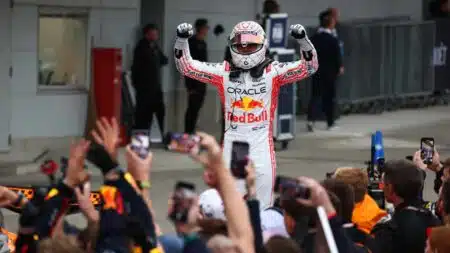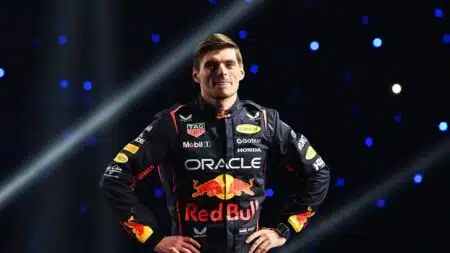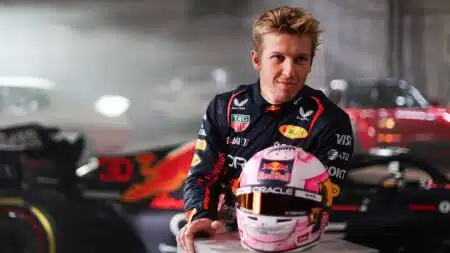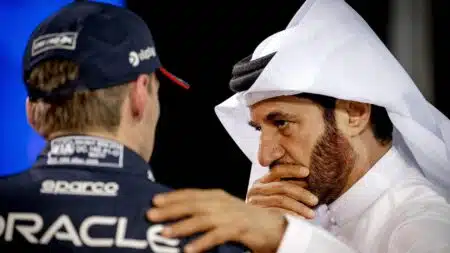
F1 snore-fest shows new cars badly needed: Up/Down Japanese GP
The 2025 Japanese GP showed a much more extreme change than next year's technical regulations is needed to make racing at classic F1 tracks interesting
This I will never understand. A car manufacturer goes to an international motor show and in advance invites members of the world’s press to interview its senior management. In short, manufacturer offers interview to journalist. This is not difficult territory. So said journalist prepares for the interview for around twice as long as the time set aside for the interview itself because you’d sooner admit to reading the Daily Mail than run out of things to ask.
Each slot is typically half an hour, so you spend an hour collating a list of questions to ask said manufacturer’s representative. The manufacturer, that is, that has invited you to the interview. In you go, shake hands, exchange a meaningless pleasantry or two, turn on the tape and ask question one.
And get no reply of any value at all. Maybe you went in a bit hard, so you tone down question two or replace it with the completely uncontentious question seven that you’d originally intended to act as a kind of mid-session interval. And nothing comes back again. More and more questions flow from you, and less and less information flows back. You start receiving comments like, ‘we’re not communicating on that point at present’, ‘all things are possible’ and the one I hate most of all: ‘we’re here to talk about the such and such’, that being the car they’ve just unveiled and about which you already possess a 10,000 word press pack.
There seems to be this notion that just because the manufacturer has made this person available, that entitles it to set the agenda for the interview. Whereas all I’m doing is sitting there with a thin smile on my face, privately fuming and wondering all the while, ‘if you weren’t going to say anything why the hell did you ask to be interviewed?’

And then, every so often, you come across someone like Wolfgang Hatz. As the head of R&D for Porsche, he’s about as interesting a bloke as you’ll find in this racket, but more importantly, he understands you’re in that room to do a job and that, so far as is professionally possible, he is there to help you in that regard. In my half an hour with him I discovered more than I have at entire shows without access to such enlightened executives. And what’s odd is I don’t think he was being indiscreet nor do I think it was my rat-like cunning that eked the information from him without him realising. Although almost all was proper news, within a few months almost all would also be old news, so was precious little to lose. And when all Porsche had to show on the stand was a slightly faster Cayenne and a GTS version of the 911 Targa, in column inches alone he had quite a lot to gain. This then, on a model by model basis, is what I learned.
Cayman: The much mooted GT4 version is a reality and, what’s more, rather than being a warmed over GTS it is a proper ‘Motorsport’ car. This means that like the 911 GT3 and GT3 RS and unlike any other Porsche, the Cayman GT4 is a product entirely of the wonderfully fertile minds of Porsche’s Weissach-based Motorsport department. In response to my suggestion that it might have 400bhp compared to the 335bhp of the GTS, Hatz said “perhaps not that much, but in that area.” He also confirmed that full race, GT4 specification cars would be made available to private individuals and race teams.
Boxster: Within a year Porsche will introduce its all new flat-four turbocharged engine into the Boxster as part of a process of, if not eliminating, then certainly drastically reducing its fine-sounding, fast-responding but thirsty and CO2-unfriendly normally aspirated engines. The engine, which Hatz promises to be “a pure Porsche engine with proper Porsche response” will be made available in both the Boxster and Cayman but not, as once suggested, in the 911. “A 911 has a flat-six engine. Period” was how he put it. There will also be a far more sporting Boxster but definitely not a GT4. Hatz would not be drawn further, but my not uneducated guess suggests a lighter, simpler, pared back car much like the Boxster Spyder of 2011. It could even be called ClubSport.

911: This will be a game-changing year for Porsche’s most iconic nameplate and the first clue to it will come at the Geneva Motor Show in March when Porsche will reveal the delayed RS version of the GT3. Hatz says it is a far more extreme car than its predecessor and that, contrary to speculation, will most definitely be normally aspirated. But, and this is big news, it will have a brand new engine related to neither the old race-derived engines used in previous GT3 and GT2 models, nor the motor in the current GT3. Would Porsche design a whole new engine for one niche product? It would not. In fact this is just its first application: this September it will go into every 911 in turbocharged form. You read that right: by this autumn, every single non-Motorsport 911 from the cheapest Carrera upwards will be turbocharged.
Cayenne: Porsche is developing a brand new turbocharged V8 to slot into the Cayenne which should allow it to lap the Nürburgring even faster. Irrelevant though it is, it is impossible not to admire the fact that the current Cayenne Turbo S can get around the Nordschleife in 7min 59sec, some seconds faster than the original Porsche 911 GT3 of 1999…
Panamera: This will receive the new V8 too, but Hatz also started smiling at the suggestion of a two door version being created as a modern 928. My very strong sense is that Porsche is already hard at work on it.

And finally… Hatz confirmed that Porsche continues to work on a mid-engined supercar to rival the likes of the Ferrari 458 and McLaren 650S. It should carry a version of the new V8 and be here by the end of the decade.
Amazing what you can find out in half an hour when talking to someone more interested in sharing their passion for what they do than covering their own backsides…

The 2025 Japanese GP showed a much more extreme change than next year's technical regulations is needed to make racing at classic F1 tracks interesting

Max Verstappen looks set to be pitched into a hectic, high-stakes battle for F1 victories in 2025, between at least four teams. How will fans react if he resorts to his trademark strongman tactics?

Red Bull has a new team-mate for Max Verstappen in 2025 – punchy F1 firebrand Liam Lawson could finally be the raw racer it needs in the second seat

The 2024 F1 season was one of the wildest every seen, for on-track action and behind-the-scenes intrigue – James Elson predicts how 2025 could go even further